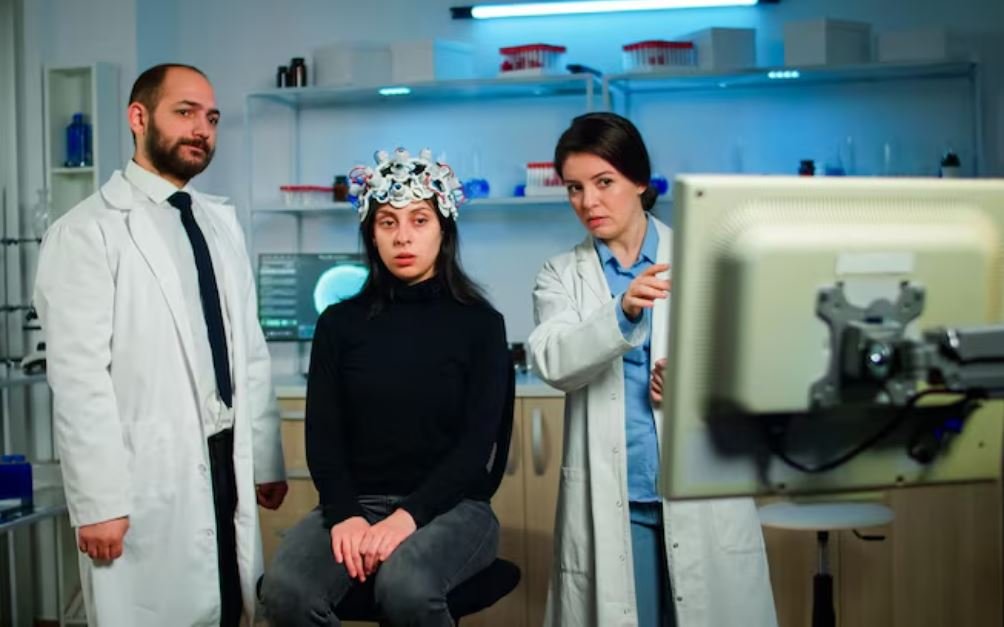
It sounds almost cinematic that a saliva test could reveal your emotional future. Experts remind us, however, that although DNA may indicate susceptibility, it does not dictate fate. Genetic testing can identify possible risks, but it cannot reliably predict who will experience mental illness, according to researchers at the National Institute of Mental Health. They explain that experience, environment, and genes interact in a remarkably complex way to determine mental health.
The emergence of precision medicine is reflected in this field of study. Psychiatry is starting to investigate how DNA affects drug response, much like genetic mapping has transformed the treatment of cancer. One particularly cutting-edge area of research looks at how genes impact how people metabolize mood stabilizers or antidepressants. Instead of providing definitive answers, it offers guidance, assisting physicians in avoiding the frequently discouraging cycle of drug trial and error.
| Focus Area | Description |
|---|---|
| Scientific Scope | Genetic testing studies DNA variations to uncover predispositions to conditions such as depression, anxiety, and bipolar disorder. |
| Predictive Accuracy | Tests indicate possible susceptibility but cannot definitively forecast mental illness. |
| Clinical Relevance | Pharmacogenetic testing supports personalized medication strategies but is still evolving. |
| Ethical Concerns | Data privacy, emotional response, and interpretation challenges remain significant. |
| Societal Impact | Shaping a more personalized and proactive approach to mental health care. |
| Reference | National Institute of Mental Health (NIMH): www.nimh.nih.gov |
Businesses such as Mapmygenome and ClarityX have made a name for themselves by figuring out these biological quirks. They promise to assist people in discovering the potential effects of their genetic patterns on resilience, mood, and focus. For certain clients, their reports are empowering because they help them better understand the chemistry underlying their feelings. However, balance is always emphasized by psychologists. While genes can offer hints, habits, experiences, and networks of emotional support have a far greater influence on results.
More and more public figures and celebrities are participating in this discussion. Celebrated for her candor about depression and anxiety, Kristen Bell has emphasized how therapy and mindfulness, not test results, are what keep her stable. Her observations are in line with the current scientific consensus that emotion is defined by lifestyle, relationships, and purpose, even though biology may play a role. In a similar vein, tech executives and professional athletes who investigate genetic testing frequently combine their findings with holistic coaching, understanding that while genes can influence effort, they can never completely replace it.
Another level of insight is provided by research from the Department of Psychiatry at Columbia University. Individual differences in the emotional reaction to genetic information are significant. While some feel uneasy or guilty, others are inspired by their accomplishments. Erik Parens and Paul Appelbaum noted that “genetic information doesn’t merely inform—it reshapes self-perception” in a report they co-authored for The Hastings Center. This emphasizes the importance of genetic counseling both prior to and following testing.
Pharmacogenetic testing is becoming more and more popular because of its potential to customize mental health care. For instance, a patient with a variation that affects serotonin metabolism may react better to SSRIs at lower dosages, which would greatly minimize side effects. In complicated cases where conventional treatments have failed, such precision can be remarkably effective. However, the FDA cautions that many psychiatric genetic tests are still in the research stage and are not yet reliable indicators of how well a patient will respond to treatment.
Our need for certainty is a fundamentally human trait that is revealed by the fascination with genetic data. We are looking for answers, not uncertainty. However, mental health defies easy fixes. The same gene that makes you more sensitive to stress may also make you more creative or empathetic. Scientists, artists, and inventors frequently use emotional intensity in incredibly positive ways. This dichotomy serves as a reminder that genetic tendencies are qualities that can be improved, balanced, and manifested via experience rather than defects.
Genetic testing can reveal risk patterns at the family level and lead to insightful discussions. For some, it motivates them to take preventative measures, such as learning stress-reduction strategies, prioritizing rest, or seeking therapy early. Others experience complicated feelings of responsibility, particularly in relation to inherited characteristics. Genetic counselors frequently characterize their work as interpreters of information and feelings, converting knowledge into empowerment instead of fear. After all, a gene is context for choice, not a verdict.
Researchers at top universities are combining their knowledge of neuroscience and genetics to create “precision psychiatry.” Researchers at King’s College London and Harvard are mapping the interactions between gene variants and the brain circuitry under stress. Their discoveries, which show how particular genetic patterns intensify emotional reactions to trauma, are especially ground-breaking. In the near future, these findings may direct preventative measures long before symptoms manifest—a move away from reactive care and toward proactive treatment.
However, moral limits are still crucial. Humanity runs the risk of being lost in translation when mental health is viewed as nothing more than data. The American Psychological Association cautions that empathy must always be at the center of care, even though knowledge of genetics can significantly improve it. At its best, psychiatry still relies heavily on communication—human interaction, attentive listening, and empathy. Although technology can help, it cannot take the place of the fundamental connection between a patient and their therapist.
Therefore, genetic testing is more of a mirror than a solution. It shows trends rather than absolutes. It promotes consciousness rather than fear. It is probable that the future of mental health care will combine sensitivity and science, combining the art of human understanding with the accuracy of genetics. Although our DNA may set the beat, it is completely up to us how we move to it through bravery, connection, and resiliency.
